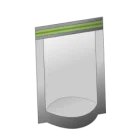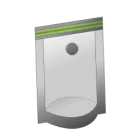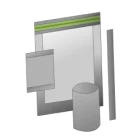Eco-Friendly Packaging for Pharmaceuticals and Supermarkets: A Step Toward Greener Healthcare
Pharmaceutical packaging is a critical component in the healthcare industry. It serves several purposes beyond simply containing and protecting the medication. The packaging of pharmaceuticals plays an essential role in preserving the quality, efficacy, and safety of drugs, while also meeting regulatory standards. Pharmaceutical packaging serves critical functions such as protecting products from contamination, ensuring proper dosage, and complying with stringent regulations.
As the demand for pharmaceuticals grows, particularly with the aging global population and increasing healthcare needs, the waste generated by the industry is also rising. Companies that embrace environmentally friendly practices are likely to improve their brand image and attract eco-conscious consumers. Pharmaceutical companies are working towards adopting sustainable practices throughout their supply chain, not just in packaging but also in the production, transportation, and distribution of medicines Shifting to eco-friendly packaging for pharmaceuticals helps address the urgent need to reduce the environmental impact.
Eco-friendly packaging for pharmaceuticals is a significant step toward achieving a circular economy, where materials are recycled and reused instead of being disposed of after a single use.
Some of the materials used for eco-friendly packaging for pharmaceuticals are:
Bioplastics are derived from renewable sources like cornstarch, sugarcane, or potatoes. These plastics decompose more easily than traditional plastics, making them an attractive alternative for pharmaceutical packaging.
Paper and cardboard are among the most sustainable packaging options. They are widely recyclable, biodegradable, and can be produced from renewable sources like trees or agricultural waste.
Blister packaging is commonly used for tablets and capsules. Traditional blister packs often use plastic or aluminum, which can be difficult to recycle. However, new biodegradable blister packs are being developed using bioplastics or recyclable materials to make them more sustainable.
Sustainable materials such as biodegradable plastics, paper-based packaging, glass, and innovative solutions like mushroom packaging offer promising alternatives to traditional packaging. While challenges such as cost, regulatory compliance, and material availability remain, the growing demand for sustainability in the pharmaceutical industry is driving innovation.
Custom packaging bags for supermarkets
Custom packaging bags for supermarkets have become an essential part of the retail experience, especially for supermarkets. They serve as functional tools for carrying groceries and other items, but they also offer supermarkets the opportunity to enhance their brand identity and contribute to sustainability efforts. These packaging bags are an excellent way for supermarkets to reinforce their brand identity. By adding logos, slogans, and unique designs, supermarkets can turn an everyday item, such as a shopping bag, into a walking advertisement.
Our custom packaging bags for supermarkets can engage customers in various ways, such as by featuring promotions or seasonal themes. Supermarkets can launch limited-edition bags with specific designs to celebrate holidays, events, or community causes. Custom packaging bags for supermarkets can be made from durable materials like cotton, polyester, or woven polypropylene. These materials are ideal for carrying heavy items like cans, bottles, and bulk products, ensuring that the bag lasts longer and doesn't tear easily.
Pharmaceutical packaging is a critical component in the healthcare industry. It serves several purposes beyond simply containing and protecting the medication. The packaging of pharmaceuticals plays an essential role in preserving the quality, efficacy, and safety of drugs, while also meeting regulatory standards. Pharmaceutical packaging serves critical functions such as protecting products from contamination, ensuring proper dosage, and complying with stringent regulations.
As the demand for pharmaceuticals grows, particularly with the aging global population and increasing healthcare needs, the waste generated by the industry is also rising. Companies that embrace environmentally friendly practices are likely to improve their brand image and attract eco-conscious consumers. Pharmaceutical companies are working towards adopting sustainable practices throughout their supply chain, not just in packaging but also in the production, transportation, and distribution of medicines Shifting to eco-friendly packaging for pharmaceuticals helps address the urgent need to reduce the environmental impact.
Eco-friendly packaging for pharmaceuticals is a significant step toward achieving a circular economy, where materials are recycled and reused instead of being disposed of after a single use.
Some of the materials used for eco-friendly packaging for pharmaceuticals are:
Bioplastics are derived from renewable sources like cornstarch, sugarcane, or potatoes. These plastics decompose more easily than traditional plastics, making them an attractive alternative for pharmaceutical packaging.
Paper and cardboard are among the most sustainable packaging options. They are widely recyclable, biodegradable, and can be produced from renewable sources like trees or agricultural waste.
Blister packaging is commonly used for tablets and capsules. Traditional blister packs often use plastic or aluminum, which can be difficult to recycle. However, new biodegradable blister packs are being developed using bioplastics or recyclable materials to make them more sustainable.
Sustainable materials such as biodegradable plastics, paper-based packaging, glass, and innovative solutions like mushroom packaging offer promising alternatives to traditional packaging. While challenges such as cost, regulatory compliance, and material availability remain, the growing demand for sustainability in the pharmaceutical industry is driving innovation.
Custom packaging bags for supermarkets
Custom packaging bags for supermarkets have become an essential part of the retail experience, especially for supermarkets. They serve as functional tools for carrying groceries and other items, but they also offer supermarkets the opportunity to enhance their brand identity and contribute to sustainability efforts. These packaging bags are an excellent way for supermarkets to reinforce their brand identity. By adding logos, slogans, and unique designs, supermarkets can turn an everyday item, such as a shopping bag, into a walking advertisement.
Our custom packaging bags for supermarkets can engage customers in various ways, such as by featuring promotions or seasonal themes. Supermarkets can launch limited-edition bags with specific designs to celebrate holidays, events, or community causes. Custom packaging bags for supermarkets can be made from durable materials like cotton, polyester, or woven polypropylene. These materials are ideal for carrying heavy items like cans, bottles, and bulk products, ensuring that the bag lasts longer and doesn't tear easily.
Reusable bags for supermarkets
Polypropylene (PP) Woven Bags are made from woven polypropylene, a sturdy, recyclable plastic material. Woven polypropylene bags are cost-effective, durable, and water-resistant. They can hold a substantial amount of weight, making them ideal for use as custom packaging bags for supermarkets. Reusable bags are typically made from cotton, canvas, or non-woven fabric. Cloth bags are durable, easy to carry, and can hold a significant amount of weight. They are eco-friendly, reusable, and have a long shelf life.
Polypropylene (PP) Woven Bags are made from woven polypropylene, a sturdy, recyclable plastic material. Woven polypropylene bags are cost-effective, durable, and water-resistant. They can hold a substantial amount of weight, making them ideal for use as custom packaging bags for supermarkets. Reusable bags are typically made from cotton, canvas, or non-woven fabric. Cloth bags are durable, easy to carry, and can hold a significant amount of weight. They are eco-friendly, reusable, and have a long shelf life.









